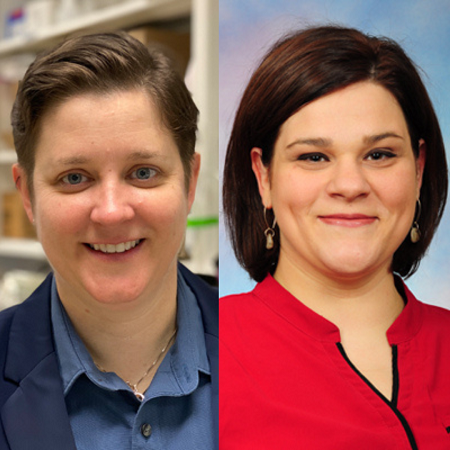Two Wayne State University School of Medicine and Barbara Ann Karmanos Cancer Institute researchers will co-lead a new grant from the National Cancer Institute of the National Institutes of Health to identify mechanisms that contribute to cancer disparities in Detroit.
Associate Professor of Oncology Kristen Purrington, Ph.D., and Assistant Professor of Oncology and of Pharmacology Heather Gibson, Ph.D., ’11 are the principal investigators on “Disparities in Immuno-oncology Outcomes in Detroit (DIODE).”

The two-year, $704,282 award will support collaborative interactions and new project development between health disparities and immuno-oncology researchers across WSU and KCI. The grant has two parts, with Drs. Gibson and Purrington leading the research project. Dr. Gibson, along with WSU Professor of Oncology and KCI Associate Chair
Deputy Director and Executive Vice President of Research and Academic Affairs Ann Schwartz, Ph.D., M.P.H., are co-principal investigators on the administrative core, which will oversee the research and planning components, centralizing and leveraging the existing administrative infrastructure of KCI, an NCI-designated Comprehensive Cancer Center.
“This award will aid in advancing inclusive health research to help develop new approaches to improve oncology treatment responses that ultimately will reduce disparities in outcomes,” said Ezemenari Obasi, Ph.D., vice president for research & innovation at Wayne State. “P20 NIH grants are awarded for programs that offer potential solutions to problems of special significance to the mission of the NIH, and I look forward to the important impact that Drs. Purrington and Dr. Gibson make with their research.”
The research portion of the grant will investigate whether specific genetic variants are related to racial differences in response to anti-HER2 therapies in HER2+ breast cancer.
“Black women with HER2+ breast cancer experience worse outcomes than White women after receiving the gold standard therapeutic antibody trastuzumab,” Dr. Gibson said. “Our hypothesis is that genetic ancestry influences whether the patient induces an anti-tumor immune response after trastuzumab, which then affects therapeutic efficacy.”
The project will extend studies in an animal model to evaluate if genetics in specific regions of the genome impact therapeutic outcomes with trastuzumab.
“The identification of genes and/or related biological pathways that regulate response to therapy may lead to novel co-therapeutic agents and/or biomarkers to inform clinical strategy and improve health equity. Additionally, funding from this mechanism will further develop our infrastructure to support future cancer disparities studies here at WSU/KCI,” Dr. Gibson said.
The research team will utilize HER2+ breast cancer samples from a diverse cohort of patients treated at KCI to conduct spatial biology analysis.
“These cutting-edge technologies allow us to look at the complex interactions between cancer cells and immune cells. Genetic analysis will be used to look for association between host genetics and the response to trastuzumab, and the immune composition within the tumor,” Dr. Gibson said.
The project number for this National Cancer Institute of the National Institutes of Health P20 award is CA290450.